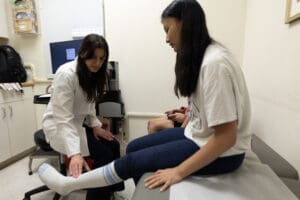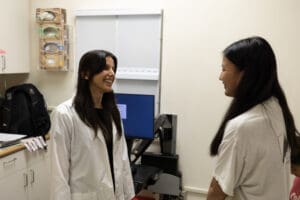For young people growing up with Spina Bifida, navigating the complexities of the adult healthcare system for the first time can be frustrating for both patients and their families. Within the Shriners Children’s healthcare system, our child-focused care is seamlessly coordinated, providing kids with the specialty attention they need. But as our young patients advance beyond the scope of our pediatric programs, they often face a fragmented and overwhelming adult healthcare system without the guiding hand of a care coordinator.
As a global leader in Spina Bifida care, Shriners Children’s is dedicated to changing this reality. We are developing tools and strategies to empower our patients with the knowledge and skills they need to take control of their care independently.
Living with Spina Bifida means requiring specialized, ongoing care that involves a range of providers, medications, and medical equipment. At Shriners Children’s, our multidisciplinary medical team works together, providing highly coordinated care that benefits our patients and supports their families. As our patients mature, we encourage them to take an active role in their care, building the resourcefulness and self-assurance they will need to guide their health journey with determination.

The most powerful skill we teach is self-advocacy. We help kids with complex medical conditions find their voice, ask questions, and make informed decisions about their own care. During clinic visits, we actively encourage patients to speak up directly and express any worries or concerns they may have. This approach not only empowers our patients and bolsters their self-confidence but also helps our care team gain a deeper understanding of each patient’s unique needs.
For many teens with Spina Bifida, taking on responsibilities at home can be a powerful way to build autonomy in their healthcare journey. Simple activities like managing their daily medication schedule or learning to independently use adaptive equipment can help them develop real-world skills. We emphasize that independence in these everyday tasks directly translates to increased confidence and ability in managing their own health and wellbeing.
While independence is crucial, we also want our patients to know they have a rock-solid support system to lean on. In our clinics, we discuss who they feel comfortable turning to for help – whether it’s family, friends, school resources, or members of their medical team. By encouraging them to build a network they can trust, we reinforce the idea that while they are learning to manage their care, they’re never alone in the journey.
As our Spina Bifida patients reach young adulthood, we collaborate closely with them to find adult healthcare professionals who are familiar with Spina Bifida or eager to learn how to support young adults with the condition. To ensure our teen patients are fully invested in their care and the transition process, we provide guidance and then encourage them to take the reins. We recommend they research family practice or other providers in their area who have experience caring for individuals with lifelong conditions that require ongoing medical attention.

Making the switch from pediatric to adult healthcare can be a significant adjustment for our patients and their families. That is why many find additional support and guidance at the CDC-supported website Got Transition, which offers resources and tools specifically for young people and families navigating this new stage.
At Shriners Children’s, our ultimate goal is to guide all of our patients in supporting them in achieving independence and encouraging them to take the lead in their own healthcare journey. By educating our adolescent and teen patients about the differences between our child-centered, patient-focused pediatric system and the more complex adult healthcare system, we are supporting the physical and emotional needs of our patients as they become young adults. We are dedicated to ensuring our patients have the tools and confidence they need to chart a healthy and fulfilling future.
To learn more about the comprehensive Spina Bifida care provided by Shriners Children’s, visit shrinerschildrens.org.
As we continue this important work, we are deeply grateful for our ongoing relationship and collaboration with the Spina Bifida Association. Their unwavering support and partnership have been instrumental in helping us advance our mission and improve the lives of individuals with Spina Bifida. Together, we are making a real difference and creating a brighter future for these incredible young people.
This post is sponsored by Shriners Children’s